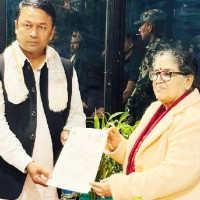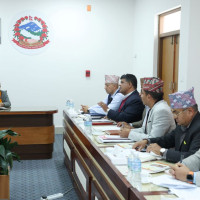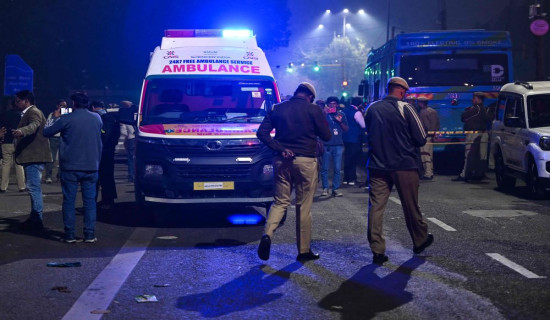- Tuesday, 11 November 2025
Israel Faces Changed Dynamics
Demonstrators in Israel last week called for an end to the war in Gaza and the release of hostages. Criticisms of the killings of civilians in Palestine have increased in many countries. That protest rallies should be held in Israel itself and some youth refuse to respond to their military service call, underscores the situation more sharply. Support for Palestinian self-determination mounts on some of Israel’s traditionally most consistent supporters, some of whom have started to step out, suggesting that things might have gone out of hand in Gaza, where humanitarian considerations have been consigned to the winds for almost three years now.
The current international focus on daily attacks and killings of mostly civilians is critical of Tel Aviv by the day. Were things not reversed, the tragedy would worsen and the credibility of the Jewish state’s core allies would dip to rock bottom. Israeli attacks have killed 62,000 Gazans, including 19,000 children, since Hamas launched a surprise attack inside Israeli territory in October 2023, in which nearly 1,200 Israelis and foreign nationals were killed and over 252 people were taken hostage. Some hostages were released in exchange for the release of Palestinian prisoners.
As of now, at least 278 journalists have been killed in 23 months since the war in Gaza began in October 2023. The figure is the highest since the Committee to Protect Journalists in 1992 started compiling such deaths. That is no good public relations material. Western nationals among journalists are few and far between among the dead. No foreign journalists are allowed in Gaza, except for rare military-escorted trips, which can be called deeply embedded visits.
Emerging consensus
Had the fate of Gazans been replicated by countries like, say, Russia, China, Turkey or Iran, how would Israel’s most valued allies have reacted? They would have clamoured for justice and either propped up proxy militants or invaded the “pariah” state, and termed the incessant brutalities on the civilians as “Holocaust II”. Several prominent political figures in Europe have begun talking about a two-state policy for ending the Israel-Palestine strife. French President Emmanuel Macron, in early August, said his country was to recognise Palestine as an independent state. In the UK, large rallies were held to press for the recognition of Palestine as an independent state.
In early August, 220 British MPs signed an open letter to Prime Minister Keir Starmer to start the process of recognising statehood for Palestine. The excesses in Gaza stirred their conscience, though Starmer rejected the appeal. A week later, in Sydney, protest rallies attended by 90,000 people condemned Israeli attacks on Gazans. Tel Aviv might persuade its die-hard supporters, like the US, to postpone the reality of the Palestinian case but cannot prevent the territory from its place perpetually. Israel has overstretched its complacency with the West’s patience. Moreover, voices supporting Palestinians are persistently louder, calling for action to protect the civilians in Palestine.
The Netherlands imposed a ban on Israeli ministers’ travel. An August survey in the US showed that nearly 53 per cent of Americans were not satisfied with Benjamin Netanyahu’s style of working and they were concerned about the killings by Israeli troops in Gaza. Washington does not bother much. It is not Vietnam where US troops were killed but in Gaza, the Israelis do the fighting and shoulder the blame. Big powers guarantee that no harm will be done against either of the states, and whichever side breaches the accord would face the fire from the guarantors, should they do the work effectively.
A group of 31 prominent Israeli public figures, including academics, artists and journalists, signed an appeal to the international community to impose “crippling sanctions” on Israel in the wake of starvation in Gaza, caused chiefly by Tel Aviv’s severe restrictions and at times blockade on relief supplies to the war-affected Gaza. At the same time, according to media reports, a growing number of Israelis refuse to fight for “Netanyahu’s war”. France, Britain, Canada and Australia have condemned the new depths of suffering inflicted on Gazans because of the long and frequent blockade on relief operations. Their decision to recognise Palestine has angered Netanyahu, who alleged growth in Europe’s anti-Semitism.
A staunch Israel supporter till recently, Britain had laid down a precondition to recognise Palestine this month unless the humanitarian conditions in Gaza improved significantly. Accused of “incitement to violence”, several European countries have sanctioned and banned two Israeli ministers.
ICC action
In December 2023, South Africa filed a case for genocide against Israel at the International Court of Justice (ICC). Chile, Colombia, Ireland, Spain, Turkiye and some other countries supported the move. A month later, ICC judges issued arrest warrants for Netanyahu and the military commander of Hamas on “reasonable grounds” that held them responsible for the alleged war crimes in the course of the ongoing war between Israel and Hamas. Although not an ICC member, the US reacted angrily and threatened the Hague-based agency’s judges with dire consequences. The US has issued sanctions against the ICC. But an increasing number of Americans voice concern over the worsening conditions in Gaza.
In July, US Senator Bernie Sanders castigated Tel Aviv for engaging in an “extermination” campaign. Israeli citizens are not allowed to enter Algeria, Bangladesh, Iran, Iraq, Lebanon, Libya, Malaysia, Oman, Pakistan, Saudi Arabia, Syria, the Maldives, and Yemen. The ban highlights the atrocities in Palestine and puts pressure on other countries to take a critical stand on the Gaza tragedy.
(Professor Kharel specialises in political communication.)

















